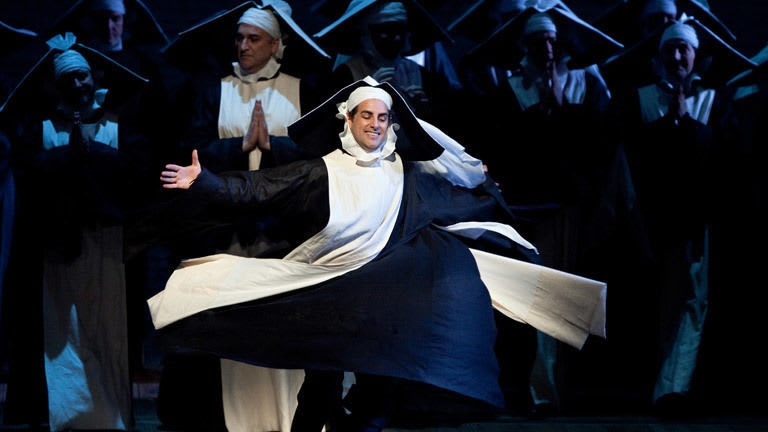Gioachino Rossini’s Le Comte Ory, which had its première in Paris in 1828, is based on a one-act vaudeville sketch which was based on a bawdy medieval ballad in which a number of men invaded a convent and had whoopee with the nuns.
Bartlett Sher’s production, conducted by Maurizio Benini, was seen at The Met in 2011. This was the first time The Met had ever staged the opera-comique. The cast is headed by Juan Diego Florez as the Count, Diana Damrau as the Countess and Joyce DiDonato as the Count’s pageboy.
Sher’s unnecessary conceit is that the story, which is set circa 1200, is being performed by singers in the 17th century on a 17th century stage with stagehands and machinery all visible. A metal sheet is shaken to provide thunder for a storm. Rossini needs no supplement.
The Count, disguised as a hermit (with a long, black beard and a long, white shift), enchants all the women whose menfolk are abroad on a crusade fighting the Saracens in the Holy Land. The hermit preaches the best cure for melancholy and loneliness is sex.
The Count is particularly keen to seduce a countess and, in order to get into her closeted women-only castle, he changes his disguise and becomes a nun, wimple and all. The Count’s pageboy has also fallen in love with the Countess.
The comic high spot is bedroom farce with three in a bed. The bed is hand-cranked up by a visible stagehand so that the audience sitting at the back of the stalls can see what is going on. It’s meant to be about two men and a woman in a bed, but since the pageboy is played by a woman it seems as if it’s about two women and a man having sex. When it comes to gender-bending, opera has always been way ahead of everybody else.
The score is effervescent. The vocal challenges, which are great, are met. Florez hits all the high Cs time and time again. The pleasure is the virtuoso singing of all three leads.
The big disappointment is how unfunny the returning crusaders are. Here, they all are in their disguise, every man, beard or not, a nun. You wait for something hilarious but it never comes. Had Sher been directing a Broadway show, I bet there would have been a high-kicking chorus line.
There are a number of ways of tapping into this opera and others at will. The Met Opera on Demand service offers annual ($149.99) and monthly ($14.99) subscriptions as well as a one-off payment ($4.99) for those who have limited time or only want to watch the occasional opera.
